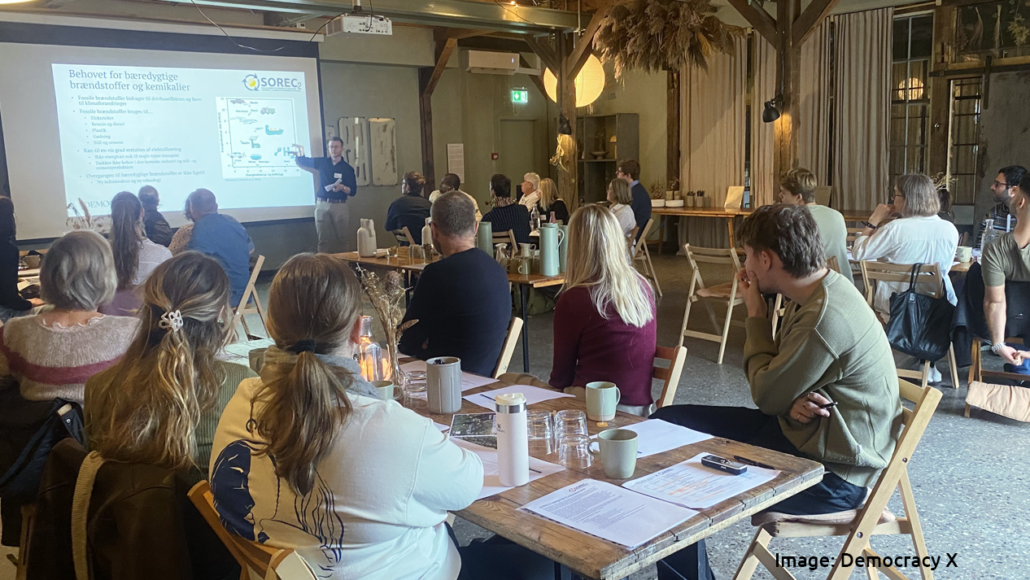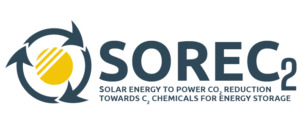Exploring public perspectives: citizen workshops on new solar-to-fuel technologies
Between October and November 2024, the SOREC2 project organized three citizen workshops in Poland, Denmark, and Spain. These citizen meetings were part of the tasks of the Work Package 5. Their primary objective was to gather public opinions and attitudes about Photo-Electrochemical Cells (PECs), ensuring the development of socially and environmentally sensitive Solar-to-Fuel technologies. Participants explored perspectives on the benefits and challenges of PECs technology, with nearly 100 participants (99 total) contributing to these discussions.
The workshops were hosted in three locations: Barcelona, Spain, which gathered 30 participants and was organized by Science for Change; Warsaw, Poland, with 34 participants, organized by Field of Dialogue; and Copenhagen, Denmark, with 25 participants, managed directly by Democracy x (former Danish Board of Technology, DBT), a SOREC2 project partner. The Spanish and Polish workshops were organized by local organizations on behalf of Democracy x, who designed the activity and supervised them.
Each workshop followed a structured dynamic. Participants were firstly introduced to PEC technology through a presentation, followed by group interviews where they discussed five key themes: general opinions on PECs, attitudes towards benefits and risks, analysis of potential implementation scenarios, non- technical issues and consequences and comparisons with other climate mitigation measures. In the final part of the events, the participants were asked to answer a concluding questionnaire of 10 questions. “The mix of methodologies – active participation in a discussion and individual production of responses – ensured that the participants were engaged throughout the process,” said Thomas Ratje, project manager from Democracy x.

Key findings: citizen attitudes towards benefits and challenges of PECs
Ensuring participants’ understanding of the topics was a significant challenge for the organizers, as the technology itself and material developed on it is quite technical in nature and usually only understood by those with previous expertise in the field. Therefore, an informational leaflet was prepared and sent to participants describing the PEC technology in less technical terms, including its potential benefits and current issues. The same information was then presented by the main facilitator at the start of each workshop to make the information even more approachable.
Spain, Poland, and Denmark were chosen as workshop locations for their diverse contexts regarding energy reliance, climate policies, and public attitudes towards renewable technologies. Furthermore, these countries reflect different solar irradiation zones within Europe, with Spain being one of the most solar-irradiated areas, which poses different scenarios for a potential future PEC deployment.

Participants across all three countries acknowledged the potential of PECs to reduce reliance on fossil fuels and contribute to global climate goals. They appreciated also the alignment of PEC technology with circular economy principles, particularly its capacity to reuse CO2 emissions.
However, some concerns among the participants were raised about the water consumption required for PEC operations. This issue was particularly acute in regions like Spain and parts of Poland, where water scarcity could pose a critical challenge.
Building public trust: engaging citizens in the development of sustainable energy solutions
“Our findings underscore the necessity for transparent communication, community engagement, and adaptive policy frameworks to align PEC development with societal and environmental priorities,” noted Aske Palsberg, project manager from Democracy x and SOREC2 team member. “Empathetically addressing these concerns could foster public acceptance and help position PEC technology as a viable contributor to global sustainability efforts. The citizens’ apprehensions are valid, and we should treat them as such.”
According to the organizers, the workshops were characterized by a positive and respectful atmosphere, with participants displaying curiosity and a willingness to engage. “The workshops completely met our expectations,” said Thomas Ratje. “They were extremely insightful and achieved their goal of gathering diverse public opinions. While challenges existed, participants were engaged, curious, and more positive about the technology than we had dared hope for.”
The organizers emphasized the critical role of public engagement in identifying and addressing social concerns about the development and deployment of new sustainable technologies. “Without public engagement in developing sustainable technologies, we risk repeating resistance seen on previous occasions, such as the opposition towards photovoltaics in Spain and wind power in northern countries like Denmark,” Thomas Ratje said.
Democracy x is now processing the data gathered during these citizen workshops. The findings will contribute to the project’s upcoming Multi-Criteria Impact Assessment event, to be hosted in Brussels later this spring. This assessment aims to align PEC technology development with societal and environmental priorities, guiding future policy frameworks through quadruple helix stakeholder engagement.




